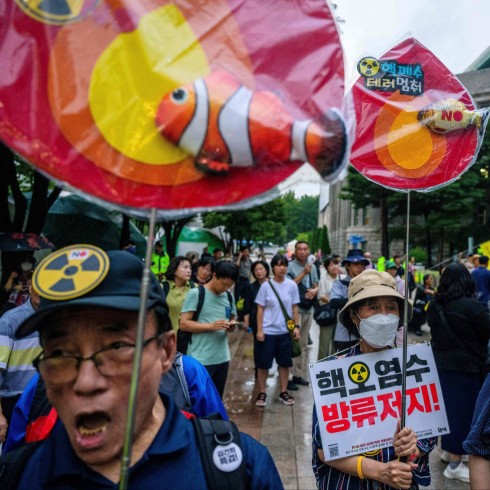Japan’s release of radioactive water from Fukushima angers China
Japan is to begin releasing radioactive water from the crippled Fukushima Daiichi nuclear plant on Thursday, prompting China to warn it would take “all steps necessary” to protect food safety and Hong Kong to ban some Japanese seafood imports.
Prime Minister Fumio Kishida confirmed on Tuesday that more than 1mn tonnes of treated water would be discharged from the plant, a process that is expected to take decades and is strongly opposed by local fishermen concerned about reputational damage.
The move had been expected after a two-year review by the International Atomic Energy Agency last month found Japan’s plan to release the water from the plant in the north-eastern prefecture of Fukushima was consistent with international safety standards.
But Tokyo timed the release to avoid sparking fresh tensions that might jeopardise a recent rapprochement with neighbouring South Korea.
People with knowledge of the discussions said Japan held off from releasing the water until after a trilateral summit at Camp David last week, where it agreed with the US and South Korea to deepen security ties to counter an increasingly assertive China.
On Tuesday, the South Korean government said it did not see any scientific or technical issues with the water release plans.
However, there remains strong public opposition in Japan and neighbouring countries, prompted by fears of possible contamination of ocean water and seafood.
Beijing, which according to Japanese media began blanket radiation testing of seafood imports from Japan last month, reiterated on Tuesday that it would take “all steps necessary” to protect food safety.
The Chinese foreign ministry also summoned Japan’s ambassador to protest against the move.

“The ocean sustains humanity. It is not a sewer for Japan’s nuclear-contaminated water. China strongly urges Japan to stop its wrongdoing,” said ministry spokesperson Wang Wenbin. “Japan is putting its selfish interests above the long-term wellbeing of the entire humanity.”
John Lee, Hong Kong’s leader, said after Tokyo’s announcement on Tuesday that the Chinese territory strongly opposed a discharge plan, which he claimed disregarded risks to food safety. “It is an irresponsible move which forcibly imposes one’s problem on to others,” he added.
Hong Kong said it would ban aquatic products from Tokyo and nine Japanese prefectures from Thursday. The ban will cover live, frozen, chilled and dried seafood products as well as sea salt and seaweed.
The Chinese territory of Macau also announced a ban on food products including seafood products from the same Japanese areas.
The Japanese consulate in Hong Kong said the ban was “extremely regrettable”. It dismissed claims Tokyo was being irresponsible, saying it had been considering the plans for six years and that these had been subject to a two-year review by the IAEA.
Seoul said it would be able to use government hotlines to ask Tokyo to stop discharging radioactive water if necessary.
“We will do our best to ensure that it is processed according to objective international standards,” foreign minister Park Jin told YTN radio.
But South Korean opposition parties are preparing to hold candlelight vigils and rallies to protest against the water release. “We strongly condemn Japan’s outrageous decision,” said Lee Jae-myung, the main opposition party leader, describing it as an “atrocity”.
The Fukushima Daiichi plant’s nuclear reactors melted down in March 2011 after a devastating tsunami knocked out their cooling systems. Water subsequently used to cool the reactors, along with groundwater flowing into the site, was contaminated with radioactive nuclides.
The contaminated water has been treated with an elaborate filtration system to remove most radioactive material. However, there is no practical way to filter out tritium, a radioactive isotope of hydrogen.
Tritium has a half-life — the time needed for half of the initial radioactive substance to decay — of 12.3 years. Radiation can be dangerous to health, but Japan maintains that the dose from the Fukushima water would be less than one-seventh of the World Health Organization’s drinking water standard.
Additional reporting by Song Jung-a in Seoul
This story originally appeared on: Financial Times - Author:Kana Inagaki



























